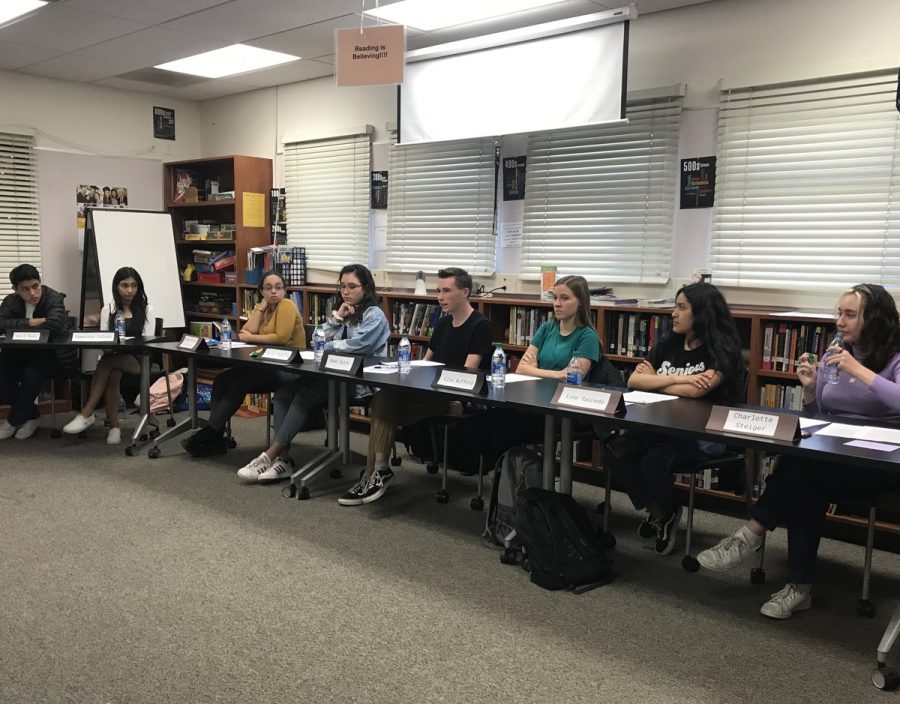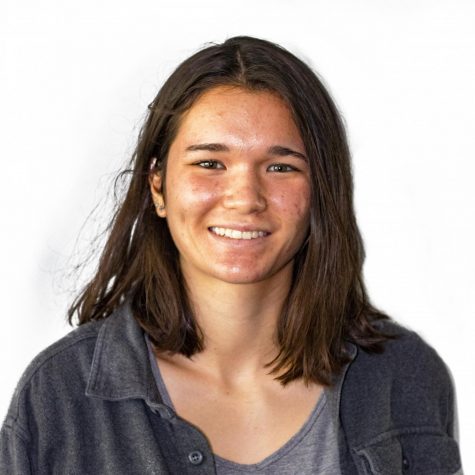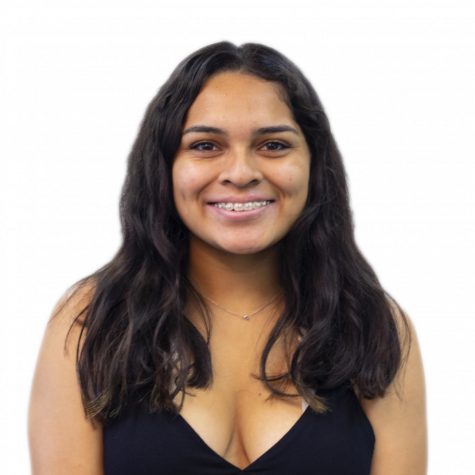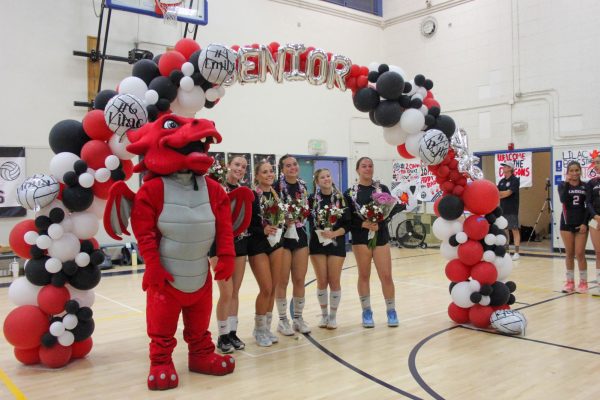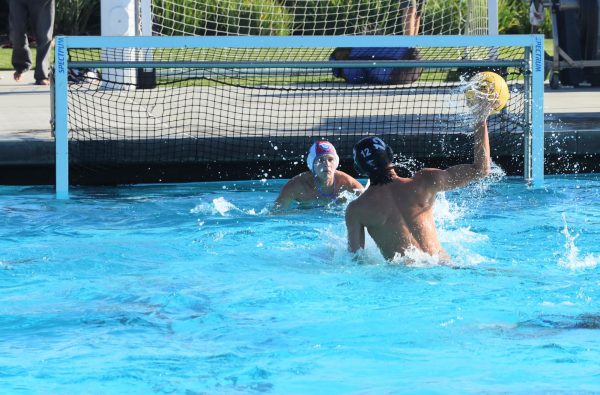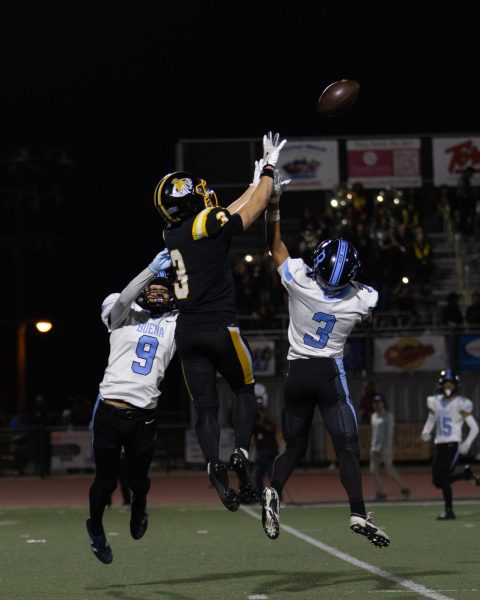Second minority panel allows students to address teachers with concerns
Student speakers on the annual minority panel.
February 9, 2020
Foothill teachers and faculty flooded the media center doors to take part in listening to a minority panel which was similar to the first-ever one held last spring. Taking place on Feb. 3, 2020, the minority panel, organized by the Be Heard club, was engineered to allow a group of students to address their concerns and impart their comments as well as advice to staff regarding the treatment of minorities on campus. This meeting was only open to staff and faculty, restricting the attendance of Be Heard members and other students.
The members of the panel included Axel Baez ’20, Elie Bufford ‘21, Sean Quinn ‘22, Esme Saucedo ‘20, Aline Silva Rodrigues ‘20, Charlotte Steiger ‘20, Dania Tadillo ‘23, Samantha Toledo ‘20 and Lesly Vaca ‘20.
The meeting began with an introduction by Interim Principal James Edwards, then followed by an explanation of the purpose of the panel which was “to inform you guys [staff and faculty] and let you guys know that students need identity affirming experiences to feel safe on this campus,” as stated by Baez.
Toledo followed by still giving credit to the staff for attempting to help minority groups at the beginning of the panel as the club recognized that “some of the concerns that we have mentioned last year [have] been addressed and they were taken into serious consideration.”
Foothill’s Inclusivity
The panel progressed in a structure where Toledo would pose a question and name the students who were to answer. Their first question that was going to be addressed was whether Foothill was an inclusive school that offers a safe space for everybody.
Tadillo found the school to be very inclusive through “fun events for everyone like Day of the Dead [and] weeks that include all different types of great people.” However, she still wanted to mention that more inclusivity could be enacted throughout the school by putting “some great ideas and points to make a difference” created by Be Heard into action that could “hopefully create an even more welcoming community for everyone.”
Bufford continued with this question remarking that many minority students have been “effectively silenced” in classrooms and by teachers who “bring up subjects that are really personal for minority students and then get mad at us for making it personal and for calling it too political that we’re bringing up our own experiences.”
She continued to say that she found that “minority identities are being used as tokens by the teachers” through using them when they “want to add to [a] debate or make it better” and asking “them to tell the class about their personal experience and give details.”
Mental Health Resources
Toledo then proceeded to ask the second question, “does Foothill take mental health as a priority and provide accessible on-campus resources that are available to all students?”
Silva Rodrigues responded to this question through discussing the fact that mental health concerns are not a high priority at Foothill and in the Ventura Unified School District (Ventura Unified) unless a “high visibility event occurs” and little to no “preventative action” happens as faculty seemingly waits until students “are breaking down on their doorsteps” to do something.
She further said that the “lack of preventative action” regarding mental health in the student body “stems from misconceptions and stigma.” Silva Rodrigues continued to explain that the assumptions about mental health create a “tendency to correlate inadequate attendance and/or not turning in homework and similar behavior with apathy towards a class or towards education in general” and these “assumptions being made about students’ dedication or intelligence” can be “incredibly discouraging.”
Saucedo expanded on the topic of mental health and started off her speech with a proposal “to give students a certain amount of days where they can essentially take a mental health day.” She backed up her proposal with a statistic about mental health in youth and those “being affected by mental illness has risen and the rate of suicide among youth of 10-24 [years-old] has risen by 56 percent” since 2019.
The mental health day proposal included a certain number of days students are allowed to take off school for the sake of their mental state and have their absence be marked as excused. Saucedo’s vision also included having mental health be put on a late slip and an excused tardy. She followed up by stating, “students need to know that they can have days to deal with their own mental health” that won’t negatively affect their attendance or “feel pressured to ignore what they feel” so students won’t be fearful of receiving a truancy letter.
Students with Individual Education Plans (IEP)
The next question posed by Toledo was, “as a student with special needs, have you had any negative experiences on campus?”
Quinn answered the question and said, “while I definitely have had some negative experiences with certain teachers” his experience on the campus hasn’t been all negative as “the special education program has been really amazing to me.” Though, he believes that “it’s important to acknowledge that Foothill could change a bit just in the context of special needs.”
He touched on the subject of extracurriculars at Foothill and the exclusion there seems to be centered around some of the programs. He said, “students with special needs, particularly those with IEPs are alienated to an extent from extracurriculars like Associated Student Body (ASB) or Bioscience.” ASB is representative of the student body and Quinn feels there needs to be more inclusion as they are “the leaders of our school” and that means accepting more students with an IEP into programs.
Quinn “feel[s] like students with IEPs are kind of discouraged from applying to these programs” because of the lack of diversity within the programs and response given by teachers and staff on the matter. Instead of indifference to the students involved in special education, he wants to see more encouragement for “special-ed students to partake in these things.”
The minority panel reinforced the idea of “identity affirming experiences.” Every concern, proposal and personal experience mentioned by the minority panel added to that idea.
LGBTQ+ Community at Foothill
The last question answered at the panel was how being apart of the LGBTQ+ community on Foothill’s campus has affected students. Quinn was the first to answer and drew attention to two key ideas that he was concerned about on campus.
ASB has been regarded by LGBTQ+ students as an organization that puts more energy “into getting school spirit and making Foothill this great school” but doesn’t help “events like Pride Week which are just as, if not more, important for LGBTQ+ youth because they do provide identity affirming experiences” as well as make “all students feel safe and welcome,” as Quinn believes.
Another issue that was addressed was the problem of heteronormativity on campus and in classrooms. From teachers asking “people who they are dating” to teachers saying “‘you boys have [all] been distracted by girls,’” LGBTQ+ students feel like “teachers often ignore queer students,” which is a problem summarized by Quinn.
Quinn added that he would like for there to be “someone like us to look up to since many queer youth lack this figure,” which he can’t find at Foothill since there were no open LGBTQ+ faculty members that he could think of.
Bufford added on the subject stating that there are “little comments” made in classroom settings that don’t allow for LGBTQ+ students to “feel safe in many of the classrooms that are on campus.” The comments made by staff “don’t mean to harm us but the teachers on this campus need to realize that there’s a lot of things that they say that can really be negatively impacting queer students.” While she feels that the teachers aren’t homophobic or transphobic, it’s the little things they do that haven’t made her “feel welcome or safe” on campus.
The comments made aren’t the only factor in making queer students feel uncomfortable in school. It’s also joking surrounded around the queer community. Bufford said the jokes that have been made “impact my learning” and when the topic of romance arises she is “shut out from the conversation” for being aromantic.
Steiger elaborated her views on this question by saying that she found there to be a lack of support from both ASB and Ventura Unified. Steiger mentioned how in the craziness of setting up and preparing for Pride Week she found that “members of ASB should have made Pride Week more of a priority even if the majority of ASB isn’t affected by LGBTQ related events,” as it forced the member of QSA to focus “more on perfecting the rally rather than enjoying it.”
Steiger proceeded to raise her concerns for the conduct of Ventura Unified as when filling out forms for a speaker for Pride Week, they were faced with discrimination. “The district claims they stand with the LGBTQ community but these topics are still listed as a controversial topic on the forms” which “implies someone’s controversial for simply existing,” which was an issue that should not go unnoticed as Steiger thinks.
While the lack of support is felt by LGBTQ+ students on campus a restriction of a basic right is occurring in the form of gender-neutral bathrooms. Steiger questioned why “the only gender-neutral bathroom we have at Foothill is [a] private, faculty-only restroom that you need special permission from staff to use. If the faculty knows that the transgender, non-binary students use this restroom than why is it only open at lunch and not during break or during classes.”
The deficiency of open bathrooms during certain times in the day restricts the basic ability of certain students who want to feel safe and comfortable by using gender-neutral bathrooms. Not only this but Steiger finds the bathroom systems “forcibly makes students out themselves when they have to ask for permission to use the teacher’s restroom,” creating an unwelcoming and discomforting environment for students that are transgender or non-binary.
The panel then departed with closing words from Edwards and a faculty only meeting was held in order for the staff to discuss their thoughts on the panel and consider potential approaches to the concerns raised.
In the end, the purpose of the panel was to make the faculty of Foothill begin to consider their own actions and enact changes that could create long term effects on the future campus in order to create a more welcoming, inclusive and well-rounded environment that will support highly needed “identity affirming experiences.”


